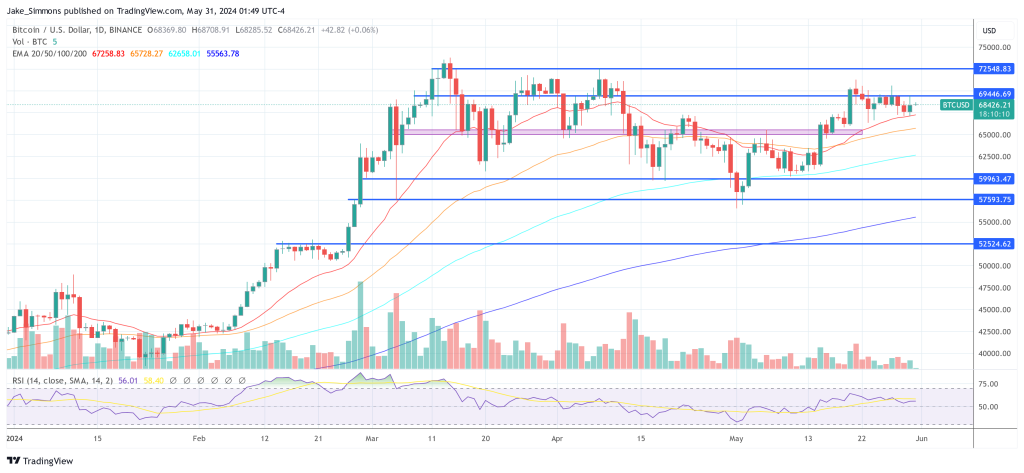As an experienced financial analyst, I find Scott Johnsson’s critique of the Biden administration’s regulatory actions towards crypto to be insightful and well-supported by evidence. The persistent regulatory barriers, aggressive enforcement actions against major players, and legislative maneuvers all suggest a deeply antagonistic stance towards Bitcoin and crypto.
Scott Johnsson, a finance lawyer at Van Buren Capital, has given a comprehensive analysis via X, pointing out strict regulatory measures and policies (referred to as Operation Chokepoint 2.0) from the Biden administration targeting the cryptocurrency industry. His assessment implies that while there have been some favorable signs such as the approval of a spot Ethereum ETF, the overall stance of the administration towards Bitcoin and cryptocurrencies remains hostile.
Persistent Regulatory Actions Against Crypto
Johnsson initiates his discussion by tackling the OCC’s refusal to instate the “fair access” banking rule proposed by ex-Comptroller Brian Brooks. This regulation intended to prevent federally chartered banks from denying financial services due to political or ideological biases towards crypto businesses. The administration’s decision against implementing this rule signifies a larger reluctance to eliminate regulatory hurdles that disadvantage the crypto industry.
This position is reinforced by numerous aggressive regulatory actions taken against notable cryptocurrency exchanges such as Coinbase, Binance, and Kraken. These crackdowns are based on an overly expansive interpretation of the term “security” according to Johnsson. The lack of clear direction from regulators has resulted in a pervasive sense of apprehension among crypto businesses due to the uncertainty surrounding potential legal actions and the far-reaching implications of securities law.
The Securities and Exchange Commission (SEC) has been notably vigorous in its enforcement actions, sending Wells Notices to notable figures in the cryptocurrency sector. Among them are Consensys, Uniswap Labs, and Paxos. In the case of Paxos, they were compelled to halt the generation of the BUSD stablecoin. These moves underscore the SEC’s determined application of securities legislation against crypto businesses, which could have a chilling effect on progress in this field.
Johnsson adds that the SEC’s decision to apply the “dealer rule” to Decentralized Finance (DeFi) platforms, making them register as exchanges and adhere to Regulation ATS, raises concerns about their decentralized structure. This action implies potential challenges for these platforms in continuing to function within the existing regulatory framework without significant adjustments.
Legislative Maneuvers And IRS Overreach
As an analyst, I would rephrase it as follows: I discovered a significant development from the Treasury Department that could impact DeFi platforms in the US. They covertly added “broker” definitions to key legislation during the night, and subsequent IRS rules broadened these definitions to potentially cover individuals and entities that go beyond traditional brokers. The potential consequences of this move are serious, as it may restrict the operations of Decentralized Finance platforms within the US jurisdiction.
Johnsson highlights the DOJ’s deviation from traditional FinCEN guidelines in targeting Tornado Cash and Samourai Wallet with money transmission charges, which could lead to serious repercussions. This change of approach represents a major turn in how privacy-centric tools are perceived under US legislation, potentially creating a challenging landscape for further advancements in blockchain privacy technology.
Banking And Institutional Barriers
As a researcher, I’m delving deeper into the ongoing regulatory landscape for banks and cryptocurrencies. The Federal Deposit Insurance Corporation (FDIC) is urging banks to keep their crypto deposit exposures below 15 percent and mandating individual approvals for new crypto business ventures. Likewise, the Federal Reserve’s rejection of Custodia’s application to join as a member and denial of a master account signify a collective push to restrict banking institutions from deepening their ties with cryptocurrency entities.
The Federal Reserve, FDIC, and OCC collectively released statements, drawing attention to the potential hazards for banks in dealing with cryptocurrencies. They advised against holding crypto assets directly on their balance sheets.
Political and Legislative Resistance
The political scene remains complex as 103 Democrats and two Republicans have endorsed Senator Warren’s letter, which overstated the part cryptocurrencies play in funding terrorism without retracting the statement later. Additionally, Senator Warren’s support for the Digital Asset Anti-Money Laundering Act (DAAMLA) includes stringent regulations that might effectively prohibit the use of crypto in practice.
Johnsson points out the persistent use of vetoes against bills such as SAB 121, which the Government Accountability Office identified as being incorrectly implemented, and brings attention to proposed legislation imposing burdensome taxes on crypto miners. Additionally, he mentions the delay in passing stablecoin legislation and the proposed ban on Central Bank Digital Currencies as part of the administration’s overall plan to restrain the expansion of the cryptocurrency industry.
According to Johnsson’s analysis, the collective efforts of the Biden administration present a robust set of regulatory, legislative, and enforcement challenges that have the capacity to limit the growth and usage of Bitcoin and cryptocurrencies within the United States.
“Johnsson argues that retracting most of these policies would only bring us back to square one, close to where the Trump administration left off. At this point, supporters can make the case that both the Trump and Biden administrations have been ‘pro-crypto’ or used other favorable labels. However, Biden continues to pose a threat to developers with potential prison sentences and remains prepared to disrupt any bank or business that dares to obstruct.”
At press time, Bitcoin traded at $68,246.

Read More
- LUNC PREDICTION. LUNC cryptocurrency
- SOL PREDICTION. SOL cryptocurrency
- BTC PREDICTION. BTC cryptocurrency
- BICO PREDICTION. BICO cryptocurrency
- USD CLP PREDICTION
- USD ZAR PREDICTION
- USD COP PREDICTION
- USD PHP PREDICTION
- VANRY PREDICTION. VANRY cryptocurrency
- SBR PREDICTION. SBR cryptocurrency
2024-05-31 09:27